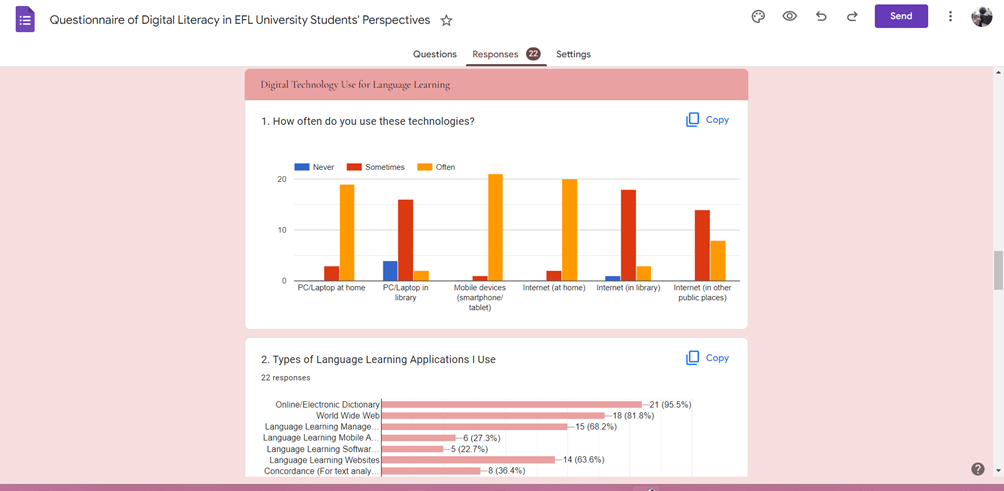Digital literacy in EFL learning: University students’ perspectives
DOI:
https://doi.org/10.21070/jees.v7i2.1670Keywords:
digital literacy, EFL learning, technology-enhanced language learningAbstract
The 21st century has widely opened the opportunity for society, specifically in the educational party, to excel their performance in digital literacy. This relates to the competence required in accessing information using media and ICT tools in the process of learning. Technology integration in EFL learning has been a common issue, yet studies in digital literacy in language learning are still scarcely being conducted. This study explores university students’ digital literacy skills and their perspectives on digital literacy in EFL learning. Two instruments were utilized through a qualitative method, including a questionnaire and interview. The findings showed some aspects of digital literacy influencing students’ EFL learning. This involves students’ information literacy, ICT and media literacy, and their perspectives on digital literacy. The result indicated that EFL university students are encouraged to apply digital literacy since almost all learning components are integrated with digital technologies. As a consequence, they showed high awareness to keep up with the latest issue on digital literacy in their EFL learning.
HIGHLIGHTS:
- Digital literacy relates to the competence required in accessing information using media and ICT tools in the learning process
- EFL university students are required to apply digital literacy skills to their learning process for the learning activity is mostly integrated with information and digital technologies.
- Providing with the data obtained from questionnaire and interview, EFL university students revealed the urgency of being literate in digital with both challenges and advantages to contribute to one of the essential skills for 21 st century’s future profession.
Downloads
References
American Library Association. (2013). Digital literacy.
APJII. (2022). Profil internet Indonesia 2022.
Belshaw, D. A. J. (2011). What is digital literacy? A Pragmatic investigation. Durham University.
Bransford, J. D., Brown, A. L., & Cocking, R. R. (2004). How people learn: Brain, mind, experience, and school. The National Academy Press.
Brett, D., & González-Lloret, M. (2009). The handbook of language teaching (M. H. Long & C. J. Doughty, Eds.). Blackwell Publishing.
Cohen, L., Manion, L., & Morrison, K. (2007). Research methods in education (Sixth Edition). Routledge.
Cote, T., & Milliner, B. (2018). A survey of EFL teachers’ digital literacy: A report from a Japanese University. Teaching English with Technology, 18(4).
Creswell, J. W. (2009). Research design: Qualitative, quantitative, and mixed methods approaches (3rd ed.). Sage Publications.
Dudeney, G., & Hockly, N. (2007). How to teach English with technology. Pearson Education Limited.
Durriyah, T. L., & Zuhdi, M. (2018). Digital literacy with EFL student teachers: Exploring Indonesian student teachers’ initial perception about integrating digital technologies into a teaching unit. International Journal of Education and Literacy Studies, 6(3), 53. https://doi.org/10.7575/aiac.ijels.v.6n.3p.53
Feerrar, J. (2019). Development of a framework for digital literacy. Reference Services Review, 47(2), 91–105. https://doi.org/10.1108/RSR-01-2019-0002
Gonzalez-Acevedo, N. (2016). Technology-enhanced-gadgets in the teaching of English as a foreign language to very young learners. Ideas on implementation. Procedia-Social and Behavioral Sciences, 232, 507-513.
Hafifah, G. N., & Sulistyo, G. H. (2020). Teachers’ ICT literacy and ICT integration in ELT in the Indonesian higher education setting. Turkish Online Journal of Distance Education-TOJDE, 21(3), 186–198.
Hague, C., & Williamson, B. (2010). Digital participation, digital literacy and schools. Curriculum and Leadership Journal, 8(10).
Hamied, F. A. (2017). Research methods: A guide for first-time researchers. UPI Press.
Johnson, K. (2017). An introduction to foreign language learning and teaching. Routledge.
Jones, O. H., & Hafner, C. A. (2012). Understanding Digital Literacies: A practical introduction. Routledge.
Kementerian Pendidikan dan Kebudayaan. (2017). Materi pendukung literasi digital.
Komlayut, S., & Srivatanakul, T. (2017). Assessing digital literacy skills using a self-administered questionnaire. Review of Integrative Business and Economics Research, 6(3), 74–85.
Kurniawati, N., Maolida, E. H., & Anjaniputra, A. G. (2018). The praxis of digital literacy in the EFL classroom: digital-immigrant vs digital-native teacher. Indonesian Journal of Applied Linguistics, 8(1), 28–37.
Martin, A. (2006). A European framework for digital literacy. Nordic Journal of Digital Literacy, 1(02), 151–161. https://doi.org/10.18261/ISSN1891-943X-2006-02-06
Shoffner, M., de Oliveira, L., & Angus, R. (2010). Multiliteracies in the secondary English classroom: Becoming literate in the 21st century. English Teaching: Practice and Critique, 9(3), 75–89.
Silverman, D. (1993). “Beginning research”. Interpreting qualitative data. Methods for Analyzing talk, text and interaction. Sage Publications.
Son, J.-B., Park, S.-S., & Park, M. (2017). Digital literacy of language learners in two different contexts. The JALT CALL Journal, 13(2), 77–96.
Trilling, B., & Fadel, C. (2009). 21st Century Skills: Learning for Life In Our Times. John Wiley & Sons, Inc.

Published
How to Cite
Issue
Section
License
Copyright (c) 2022 Intan Pertiwi, Rodliyah Rojab Siti

This work is licensed under a Creative Commons Attribution 4.0 International License.







